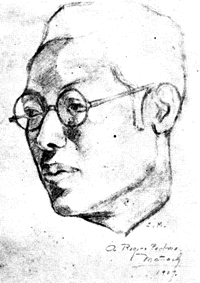4.1.1.10.2 The poem “Fraternal greeting to the mechanical workshop”, by Regino Pedroso, 1927

“Fraternal Salutation to the Mechanical Workshop” appeared on the Cuban poetic scene in 1927 with singular thematic and expressive audacity. Using techniques similar to the avant-garde, of which Pedroso was not a full member, it addresses the essence of the socially conditioned personality of the Cuban worker and the material and spiritual sphere in which he fulfills his hard work.
Its lexical affinity with avant-garde is given by the need to refer to the symbols of industrial progress – machinery, railways, the factory in general – as a space in which the daily life of the worker takes place, but denouncing his situation and raising his accusing finger not only towards the political system as a harsh background but also the subordinate condition of the Island with respect to North America.
The poem was chosen by José Lezama Lima for his selection of the 100 best Cuban poems, of which he did not, however, make any critical comment. Some stanzas from this inaugural piece of our social poetry are reproduced:
“Violent tension of effort
muscular. Tongues of steel, the sledgehammers
they rehearse stridentist poems on the anvils
of avant-garde literature.
Symphonic metallurgy
of instrumental machinery;
Ultraist images of transmissions and pulleys;
Soviet exaltation of forges.
“Oh, workshop, iron ovary of production! You gasp
like a large chest that tires.
Trending topic of the moment
for geometric cubism
and impressionism of metaphors.
But you have a collective soul
made of societal struggles;
of worries, of hunger, of lust,
of poor, ruined flesh:
soul forged by the hatred of social injustices
and dull yearnings for revenge…
You shake, you suffer, you are
more than a reason for words.
(…)
I doubt sometimes, and other times,
I throb, and I tremble, and I vibrate with your immense hope;
and I hear in my flesh the deep TRUTH of your apostles:
“You are the cosmic entrails that incubate tomorrow!”
The text reveals all the desire for struggle accumulated by the workers and even, from a certain interpretation, their closest ancestors, the slaves, all of which has shaped a collective voice that explodes in protest even against machines, in their ambiguous role as enablers of work and therefore of subsistence and at the same time as an instrument through which domination is fundamentally exercised.
In a general sense, this piece by Regino Pedroso has a pioneering value for our socially inspired poetry and even connects with the doctrine of socialism and its slow incubation on the island, whose main figures he mentions reverently. The poem’s theme and artistic conception were innovative at the time and embodied a commitment to social transformation at the hands of the proletarians.








